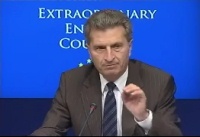European Union (EU) ministers have agreed to launch a safety assessment of Europe's 143 nuclear power reactors, re-checking their safety in the light of the Fukushima nuclear accident.
 |
| Energy commissioner Günter Oettinger warns that some plants may not pass the test |
Fellegi said: "We should ensure the highest standards are in place in the European Union. There is a shared willingness amongst us to launch a process for defining a comprehensive safety and risk assessment," he said, noting that final decisions on how this would be undertaken would be discussed at a scheduled EU energy council in June.
"We should be transparent on the outcome of these assessments and [national] measures," Fellegi promised. The EU executive the European Commission will work with the European Nuclear Safety Regulators Group (ENSREG) would "define the scope and modalities of such tests" drawing lessons from the accidents in Japan, he said.
Experts would examine reactors' vulnerability to seismic events, their exposure to flooding, as well as man-made disasters (such as power cuts and terrorism), with special attention being paid to cooling and back-up systems. Welcoming steps so far taken by national nuclear energy authorities, Fellegi stressed that although the EU would closely monitor global energy prices "the energy markets of member states have so far been unaffected and able to cope well largely through market mechanisms…" The EC would also want to improve cooperation between nuclear safety regulators and would draw on international organisation assistance in these tests.
The meeting was staged after weekend comments from Germany's chancellor Angela Merkel calling for common EU nuclear security standards – a significant shift from previous German government positions. In a weekly podcast, she said: "We have standardised all sorts of things in the European Union, from the size of apples to the shape of bananas, and we could also really talk about common safety measures for all the nuclear centres in Europe."
Also, looking forward to these tests being authorised, EU energy commissioner Günther Oettinger predicted to Franco-German TV channel Arte that these "stress tests… on all the nuclear reactors will show that not all of them meet the highest standards."
Some European Parliament members have called for the tests to be wide in scope – Swedish Green MEP Carl Schlyter hoped that "they include the whole production chain, e.g. transport, waste treatment and plant security."
Oettinger last Tuesday told a meeting of the European Parliament's environment committee that it was too early to say whether the Japanese accident would push the EU to opposing nuclear power, after ten years of becoming increasingly positive about its future: "There was no agreement as to whether or not this is a turning point for the EU future energy policy... but there was a common view on the need for a safety review," he told MEPs.
However, his colleague climate action commissioner Connie Hedegaard has told a European Wind Energy Association that EU decisions on funding new energy capacity were "very much likely to be influenced" by the Fukushima accidents. She said: "We can say that if we do not want nuclear, we should have even more cheap fossil fuels to replace it, or we could say: 'Why not use this opportunity to address the necessity of moving towards a low-carbon emissions society?'"
Meanwhile, British Liberal Democrat MEP Chris Davies warned of the risks of turning away from nuclear energy: "We do not want as a result... to end up turning more and more to coal and abandoning our objective of achieving a low carbon economy."
By Keith Nuthall
for World Nuclear News




_18570.jpg)
_18938.jpg)
_33584.jpg)
_82983.jpg)





